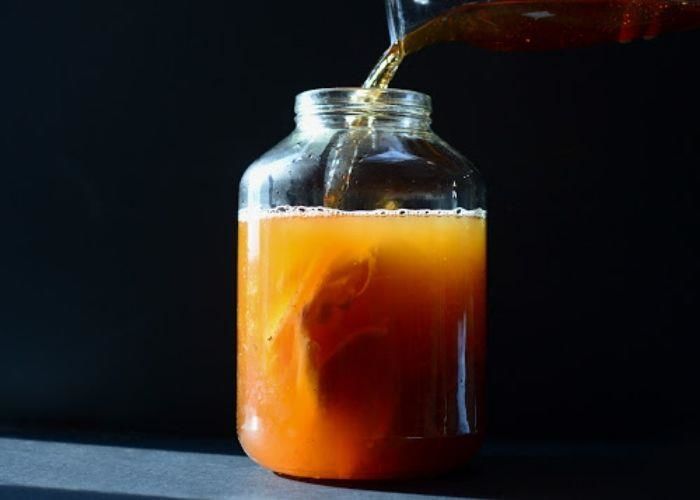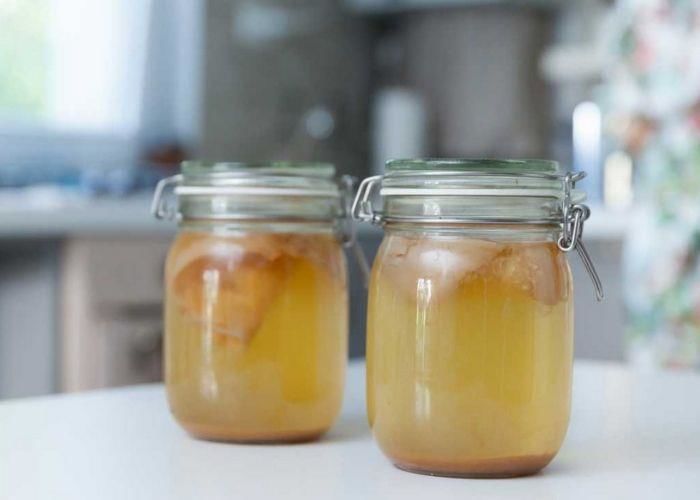This post was most recently updated on July 25th, 2023
Have you ever heard of Kombucha water ginseng tea and its health benefits? If you do not know too much about this tea, let’s find out what kombucha tea is? What is the effect of kombucha tea on health?
What is Kombucha?

Kombucha is a tea originating from Manchuria, fermented with a seed mushroom, the main ingredients include tea, sugar, bacteria, and yeast. Kombucha is a name commonly called by the Japanese, in addition, it is also known as aquatic mushroom, Truong Sinh mushroom, and Thuy Hoai Sam (by the Chinese).
Kombucha tea is fermented with a seed of mushroom. Thanks to the seed Scoby (short for Symbiotic Colony of Bacteria and Yeast, meaning symbiosis of bacteria and yeast). If you don’t know what Scoby is, this is a yeast that is grown in sugar-sweetened tea to create a mildly acidic effervescent drink. Scoby is rubber-like, quite thick, round, and cloudy with a slight vinegar-like odor.

During fermentation, Scoby breaks down tea sugars and releases probiotic bacteria. The result is a post-fermented carbonated drink called kombucha tea. Some say it smells like beer and tastes like apple cider vinegar, others say it resembles wine. Although there are no mushrooms in Kombucha tea, it is sometimes called Kombucha mushroom tea.
After fermentation, Kombucha tea contains vinegar, B vitamins , enzymes, probiotics (bacteria and yeasts that have positive effects on the digestive system) and has a high content of acids (acetic, gluconic and lactic) so it is also available. considered as a functional food with many health benefits.
Health Benefits of Kombucha tea

Promotes gut health
Kombucha also contains high levels of beneficial probiotics and enzymes. Probiotic bacteria have been shown to help treat diarrhea, and some studies suggest they may help alleviate irritable bowel syndrome (IBS).
Kombucha is rich in Polyphenols (which are abundant in tea) and acetic acid (abundant in vinegar) – both of which have been shown to inhibit the growth of harmful bacteria and yeasts.
In addition, some studies show that kombucha tea has the ability to prevent and heal intestinal damage and stomach ulcers. In addition, Kombucha has bacteria but are beneficial types, against harmful bacteria in the digestive system.
Prevent cancer cells from growing
Kombucha tea is rich in antioxidants – substances that fight free radicals, or destructive reactive molecules, damage the cells in the body, so it has many effects to help prevent the development of cancer.
Many scientists believe that antioxidants from foods and drinks, will be better for the health of people with cancer than when supplementing antioxidants in other forms. Therefore, drinks made from Kombucha, especially when Scoby is grown in green tea, will have even more antioxidant effects, helping to prevent the growth of cancer cells.
Immune booster
Thanks to its antioxidants, Kombucha tea also has the ability to balance the immune system. There is clinical evidence that the fermentation of Scoby in Kombucha tea results in the formation of the powerful antioxidant D-saccharic acid-1, 4-lactone (DSL), which helps reduce oxidative stress and inhibitory conditions. immunity.
In addition, thanks to the high content of vitamin C, Kombucha tea is effective against cell damage, inflammatory diseases, tumors, and immunodeficiency states.
Reduce the risk of cardiovascular disease
Kombucha tea has been shown to improve bad LDL cholesterol levels and provide good HDL cholesterol in mice (which has many similarities in the human body), significantly improving markers of heart disease only in 30 days.
In fact, as we all know, green tea drinkers have a 31% lower rate of heart disease along with a few other health benefits. Therefore, when kombucha is grown in green tea, it will have the same effect.
Support weight loss
Tea is a weight loss aid that has been used since ancient times, because tea leaves often contain a lot of antioxidants, improving metabolism and reducing body fat. Raising Scoby with green tea produces kombucha tea that contains high levels of acetic acid and polyphenols, antioxidants that have a positive effect on weight loss.
Control type II diabetes
So far, many studies have shown, using kombucha can improve some markers of type 2 diabetes in the body. Kombucha has the ability to slow the digestion of carbohydrates and sugars, while reducing blood sugar levels as well as improving liver and kidney function, especially when you keep Kombucha in green tea.
Improve joint cartilage, maintain collagen for the body
Kombucha contains glucosamine that enhances the production of synovial hyaluronic acid, which in turn maintains collagen and fights joint pain. Along the same mechanism, it also supports the maintenance of collagen for the whole body and reduces wrinkles caused by aging.
Improve mental health
The probiotics in kombucha are believed to have the ability to treat depression. This is based on a link between the markers of infection and depression. Thus, the anti-inflammatory effects of kombucha are thought to help ease some of the symptoms of depression.
In addition, Kombucha tea also adds energy to the drinker because iron is released from black tea during the fermentation process. Kombucha also contains caffeine (albeit in very small amounts) and the B vitamins can energize your body to help you feel more positive.
How to make Kombucha tea from Scoby

To have a delicious pot of Kombucha tea, the most important thing is whether or not to breed Kombucha properly. If you do not know how to raise Scoby to make Kombucha tea, please refer to our guide below.
Ingredients (for 1 liter of tea)
- Green tea, or black tea: 2 bags.
- White sugar: 100g.
- Water: 1 liter.
- Glass bottle wide mouth 3 – 5 liters capacity (not recommended plastic bottles).
- Kombucha Scoby: 1 child.
Note: The rule to make a good batch of kombucha tea is that the ingredients and the process must always be clean.
- It is recommended to use water that has been filtered by drinking water filters, or boiled water, low in calcium, no chlorine, no alkali, or fluoride. Do not use high-content mineral water.
- You can use many different types of tea according to your preferences, however, you should pay attention that the sprayed tea leaves, the more difficult the chemical are to form Scoby yeast, or the yeast that is susceptible to disease, Kombucha is not aromatic so it is best to use. organic dry tea.
- Organic sugar/cane sugar is required for the fermentation process. Must use enough sugar to create habitat for Scoby, do not use sweeteners, bleaching sugar …
- You can ask people to make yeast, buy dried yeast, or buy organic kombucha to get yeast.
- Need to sterilize all tools before use.
Making
- Step 1: Boil the water, let the tea soak for about 5 minutes, and stir in sugar. Then let the sugar tea cool down before pouring into the glass jar. Tea is made with the formula: 1 liter of water – 100gr of sugar – 2 tea packages.
- Step 2: Wash your hands, dry and put on gloves, then remove the Kombucha mushroom and rinse with water to remove the tea residue on it.
- Step 3: Gently drop the Kombucha mushroom into the sugar teapot, then cover the mouth with cheesecloth and tie it with elastic fibers. This will help prevent insects from entering as well as allow the bacteria of the yeast to have air for metabolism and easier to ferment.
- Step 4: Place the mushroom in a cool place, away from direct sunlight. Ideally, you should place the teapot in a cool place about 23 ° C – 29 ° C will create flavor and aroma for the finished product. Tea should not be placed next to other fermented foods such as pickles, wine … it is easy to ferment tea faster.
When is the tea fermented successfully?
For those who try to make this Kombucha tea for the first time, it is difficult to know whether their tea batch has been successful or not. Here are a few signs that you can use to make this more easy to spot:
- The tea becomes less sweet and sour, the scoby thickens, the surface emerges of brown, translucent mushrooms or has a small scoby on the surface of the solution, the tea is light in color.
- Scoby yeast floats on the surface, sinks below or goes sideways in the jar
- Red-brown streaks may appear underneath the enamel.
- Kombucha has a pleasant smell, if there is an unpleasant, moldy odor, then Kombucha is infected, you should pour and rework.
- If there are signs of mold, discard and start over.
The above information hopes to help you understand what kombucha is, what effect kombucha tea has for the health of users. Hopefully, with the guidance of Health My Lives , you will successfully make this nutritious drink for the whole family to use.


